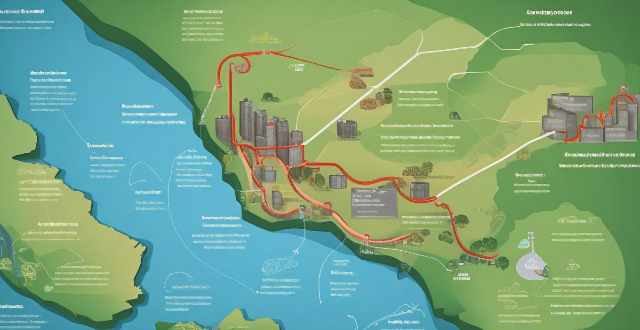The article discusses the differences in stance on climate change negotiations between developed and developing countries. Developed countries view climate change as an urgent issue that requires immediate action and are willing to take steps to reduce their carbon footprint, including investing in renewable energy sources and sustainable practices. They also acknowledge their historical responsibility for contributing to greenhouse gas emissions and are financially capable of investing in climate change initiatives. On the other hand, developing countries prioritize economic growth and development over immediate climate action and emphasize the importance of fairness and equity in negotiations. They focus on adapting to the impacts of climate change and building resilience against its effects, seeking financial support from developed nations to help them transition to low-carbon economies and implement adaptation measures. The article concludes that finding common ground between these differing perspectives will be crucial for effective global cooperation in addressing climate change challenges.

Differences in Stance on Climate Change Negotiations between Developed and Developing Countries
Introduction
Climate change negotiations have become a crucial topic of discussion worldwide. However, the perspectives and priorities of developed and developing countries often differ significantly. This article aims to explore these differences and provide insights into how each group approaches climate change negotiations.
Developed Countries' Perspective
Key Points:
- Urgency: Developed countries tend to view climate change as an urgent issue that requires immediate action. They often emphasize the need for global cooperation and collective efforts to mitigate its impact.
- Responsibility: Many developed nations acknowledge their historical responsibility for contributing to greenhouse gas emissions and are willing to take steps to reduce their carbon footprint.
- Technology and Innovation: These countries typically have access to advanced technologies and innovations that can help address climate change challenges. They often promote the use of renewable energy sources and sustainable practices.
- Financial Commitment: Developed nations are usually more financially capable of investing in climate change initiatives, including funding research, supporting renewable energy projects, and providing aid to vulnerable communities affected by climate change.
Examples:
- European Union (EU): The EU has been a leading advocate for aggressive climate action, setting ambitious targets for reducing greenhouse gas emissions and promoting renewable energy sources across its member states.
- United States: Under the leadership of the Biden administration, the US has rejoined the Paris Agreement and committed to taking significant steps to address climate change, including investing in clean energy infrastructure and promoting electric vehicles.
Developing Countries' Perspective
Key Points:
- Economic Development: Developing countries often prioritize economic growth and development over immediate climate action. They argue that restrictive measures could hinder their progress towards prosperity.
- Fairness and Equity: These nations emphasize the importance of fairness and equity in climate change negotiations. They believe that developed countries should bear a greater burden due to their historical contribution to greenhouse gas emissions.
- Adaptation and Resilience: Developing countries are more focused on adapting to the impacts of climate change and building resilience against its effects, as they often lack the resources to invest heavily in mitigation efforts.
- Financial Assistance: They seek financial support from developed nations to help them transition to low-carbon economies and implement adaptation measures.
Examples:
- India: As a rapidly developing nation with a large population, India has stressed the importance of balancing climate action with economic growth. It has called for equitable sharing of responsibilities and financial assistance from developed countries.
- African Nations: Many African countries are vulnerable to the adverse effects of climate change, such as droughts and floods. They have emphasized the need for international support to build resilience and adapt to changing climate conditions.
Conclusion
The stance on climate change negotiations between developed and developing countries reflects their differing priorities, capabilities, and historical contexts. While developed nations often focus on mitigating climate change through aggressive action and investment, developing countries prioritize economic growth, adaptation, and equity in negotiations. Bridging these gaps and finding common ground will be crucial for effective global cooperation in addressing the challenges posed by climate change.